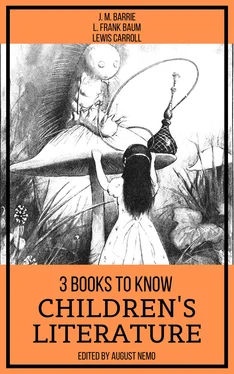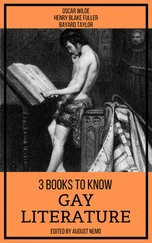1 ...8 9 10 12 13 14 ...18 ‘Two days wrong!’ sighed the Hatter. ‘I told you butter wouldn’t suit the works!’ he added looking angrily at the March Hare.
‘It was the best butter,’ the March Hare meekly replied.
‘Yes, but some crumbs must have got in as well,’ the Hatter grumbled: ‘you shouldn’t have put it in with the bread-knife.’
The March Hare took the watch and looked at it gloomily: then he dipped it into his cup of tea, and looked at it again: but he could think of nothing better to say than his first remark, ‘It was the best butter, you know.’
Alice had been looking over his shoulder with some curiosity. ‘What a funny watch!’ she remarked. ‘It tells the day of the month, and doesn’t tell what o’clock it is!’
‘Why should it?’ muttered the Hatter. ‘Does your watch tell you what year it is?’
‘Of course not,’ Alice replied very readily: ‘but that’s because it stays the same year for such a long time together.’
‘Which is just the case with mine ,’ said the Hatter.
Alice felt dreadfully puzzled. The Hatter’s remark seemed to have no sort of meaning in it, and yet it was certainly English. ‘I don’t quite understand you,’ she said, as politely as she could.
‘The Dormouse is asleep again,’ said the Hatter, and he poured a little hot tea upon its nose.
The Dormouse shook its head impatiently, and said, without opening its eyes, ‘Of course, of course; just what I was going to remark myself.’
‘Have you guessed the riddle yet?’ the Hatter said, turning to Alice again.
‘No, I give it up,’ Alice replied: ‘what’s the answer?’
‘I haven’t the slightest idea,’ said the Hatter.
‘Nor I,’ said the March Hare.
Alice sighed wearily. ‘I think you might do something better with the time,’ she said, ‘than waste it in asking riddles that have no answers.’
‘If you knew Time as well as I do,’ said the Hatter, ‘you wouldn’t talk about wasting it . It’s him .’
‘I don’t know what you mean,’ said Alice.
‘Of course you don’t!’ the Hatter said, tossing his head contemptuously. ‘I dare say you never even spoke to Time!’
‘Perhaps not,’ Alice cautiously replied: ‘but I know I have to beat time when I learn music.’
‘Ah! that accounts for it,’ said the Hatter. ‘He won’t stand beating. Now, if you only kept on good terms with him, he’d do almost anything you liked with the clock. For instance, suppose it were nine o’clock in the morning, just time to begin lessons: you’d only have to whisper a hint to Time, and round goes the clock in a twinkling! Half-past one, time for dinner!’
(‘I only wish it was,’ the March Hare said to itself in a whisper.)
‘That would be grand, certainly,’ said Alice thoughtfully: ‘but then—I shouldn’t be hungry for it, you know.’
‘Not at first, perhaps,’ said the Hatter: ‘but you could keep it to half-past one as long as you liked.’
‘Is that the way you manage?’ Alice asked.
The Hatter shook his head mournfully. ‘Not I!’ he replied. ‘We quarrelled last March—just before he went mad, you know—’ (pointing with his tea spoon at the March Hare,) ‘—it was at the great concert given by the Queen of Hearts, and I had to sing
“Twinkle, twinkle, little bat! How I wonder what you’re at!” You know the song, perhaps?’‘I’ve heard something like it,’ said Alice.‘It goes on, you know,’ the Hatter continued, ‘in this way:— “Up above the world you fly, Like a tea-tray in the sky. Twinkle, twinkle—“’
Here the Dormouse shook itself, and began singing in its sleep ‘ Twinkle, twinkle, twinkle, twinkle —’ and went on so long that they had to pinch it to make it stop.
‘Well, I’d hardly finished the first verse,’ said the Hatter, ‘when the Queen jumped up and bawled out, “He’s murdering the time! Off with his head!”’
‘How dreadfully savage!’ exclaimed Alice.
‘And ever since that,’ the Hatter went on in a mournful tone, ‘he won’t do a thing I ask! It’s always six o’clock now.’
A bright idea came into Alice’s head. ‘Is that the reason so many tea-things are put out here?’ she asked.
‘Yes, that’s it,’ said the Hatter with a sigh: ‘it’s always tea-time, and we’ve no time to wash the things between whiles.’
‘Then you keep moving round, I suppose?’ said Alice.
‘Exactly so,’ said the Hatter: ‘as the things get used up.’
‘But what happens when you come to the beginning again?’ Alice ventured to ask.
‘Suppose we change the subject,’ the March Hare interrupted, yawning. ‘I’m getting tired of this. I vote the young lady tells us a story.’
‘I’m afraid I don’t know one,’ said Alice, rather alarmed at the proposal.
‘Then the Dormouse shall!’ they both cried. ‘Wake up, Dormouse!’ And they pinched it on both sides at once.
The Dormouse slowly opened his eyes. ‘I wasn’t asleep,’ he said in a hoarse, feeble voice: ‘I heard every word you fellows were saying.’
‘Tell us a story!’ said the March Hare.
‘Yes, please do!’ pleaded Alice.
‘And be quick about it,’ added the Hatter, ‘or you’ll be asleep again before it’s done.’
‘Once upon a time there were three little sisters,’ the Dormouse began in a great hurry; ‘and their names were Elsie, Lacie, and Tillie; and they lived at the bottom of a well—’
‘What did they live on?’ said Alice, who always took a great interest in questions of eating and drinking.
‘They lived on treacle,’ said the Dormouse, after thinking a minute or two.
‘They couldn’t have done that, you know,’ Alice gently remarked; ‘they’d have been ill.’
‘So they were,’ said the Dormouse; ‘ very ill.’
Alice tried to fancy to herself what such an extraordinary ways of living would be like, but it puzzled her too much, so she went on: ‘But why did they live at the bottom of a well?’
‘Take some more tea,’ the March Hare said to Alice, very earnestly.
‘I’ve had nothing yet,’ Alice replied in an offended tone, ‘so I can’t take more.’
‘You mean you can’t take less ,’ said the Hatter: ‘it’s very easy to take more than nothing.’
‘Nobody asked your opinion,’ said Alice.
‘Who’s making personal remarks now?’ the Hatter asked triumphantly.
Alice did not quite know what to say to this: so she helped herself to some tea and bread-and-butter, and then turned to the Dormouse, and repeated her question. ‘Why did they live at the bottom of a well?’
The Dormouse again took a minute or two to think about it, and then said, ‘It was a treacle-well.’
‘There’s no such thing!’ Alice was beginning very angrily, but the Hatter and the March Hare went ‘Sh! sh!’ and the Dormouse sulkily remarked, ‘If you can’t be civil, you’d better finish the story for yourself.’
‘No, please go on!’ Alice said very humbly; ‘I won’t interrupt again. I dare say there may be one .’
‘One, indeed!’ said the Dormouse indignantly. However, he consented to go on. ‘And so these three little sisters—they were learning to draw, you know—’
‘What did they draw?’ said Alice, quite forgetting her promise.
‘Treacle,’ said the Dormouse, without considering at all this time.
‘I want a clean cup,’ interrupted the Hatter: ‘let’s all move one place on.’
He moved on as he spoke, and the Dormouse followed him: the March Hare moved into the Dormouse’s place, and Alice rather unwillingly took the place of the March Hare. The Hatter was the only one who got any advantage from the change: and Alice was a good deal worse off than before, as the March Hare had just upset the milk-jug into his plate.
Читать дальше












